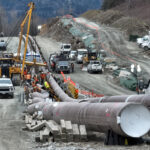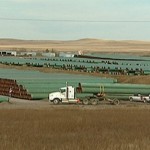Minutes before Finance Minister Travis Toews stood up to speak to a Calgary business audience about the stressed state of Alberta’s finances, another court ruling about an oil pipeline came barrelling down the track.
Another day, another potential delay for the Trans Mountain project.
“As other Albertans have been frustrated, we have been very frustrated with that process,” Toews told reporters Wednesday after addressing a Calgary Chamber of Commerce luncheon about the MacKinnon panel financial report.
“The fact we can’t get a pipeline to tidewater in a reasonably predictable timeline is incredibly frustrating.”
A few blocks away at the McDougall Centre, Energy Minister Sonya Savage had a similar response, expressing disappointment with another potential setback.
“It’s over and over and over again,” Savage told reporters.
“This is part of the game plan of some of these activist organizations, is you litigate over and over and over again until project proponents give up.”
To be clear, Wednesday’s Federal Court of Appeal decision on the Trans Mountain pipeline expansion did not derail the long-awaited project, which recently moved to restart construction.
But the ruling did give permission for six of 12 legal challenges to be heard against the federal government’s re-approval in June of the project.
The courts will examine, on an expedited basis, the narrow issue of whether Ottawa’s consultations with Indigenous communities and First Nations on the project were adequate.
Unlike the seismic August 2018 court decision that placed the federally owned project in legal limbo for months because of inadequate consultation with First Nations during the first approval process, the pipeline’s expansion work can continue.
But as Toews spoke to the chamber about the MacKinnon report into the state of Alberta’s finances and need for spending restraint, the pipeline news served as a symbolic kick in the shins for a government that also needs to increase revenues to balance its budget.
“If we continue to see constrained market access . . . we can’t see that. I put it this way — it is a possibility, but we can’t stand for that as Albertans,” he told the crowd.
“That’s the challenge we face, as we commit to Albertans to balance the budget. We face the challenge of doing so in a very volatile market.”
The MacKinnon report, which called for the province to make at least $600 million in spending cuts to balance the budget within four years, also laid out in black and white what’s at stake financially in the pipeline fight.
Using current budget forecasts, the province expects to generate about $50 billion in revenues in 2019 and 2020, climbing to $53 billion and $57 billion in the following two years.
Under a “continued constrained market access scenario” detailed in the report, those projections would be reduced if pipelines aren’t completed.
Government revenues would shrink by $4.1 billion by 2022-23, it found.
You can build a lot of schools and hospitals — or significantly reduce the deficit — with $4 billion.
However, the government needs increased pipeline capacity to make that happen.
Enbridge’s Line 3 replacement project is now expected to be completed and operating in the second half of next year, followed by Trans Mountain and TC Energy’s Keystone XL development.
Yet, projects that would solve Canada’s market access constraints have been repeatedly delayed.
For business leaders, the latest ruling adds more uncertainty to the ever-shifting legal, regulatory and political landscape to get major projects built.
“It’s another hurdle, it’s another passage to go through, but we are going to get there,” said chamber president Sandip Lalli.
“Canadian businesses are continually frustrated at what is good enough and will we ever get anything done in the country,” said Adam Legge, president of the Business Council of Alberta.
The effect of another legal challenge that could sidetrack Trans Mountain isn’t simply measured in dollars and cents.
Mayor Naheed Nenshi believes these ongoing delays are denting confidence in the economic recovery and are having a psychological effect on Calgarians.
“Sometimes, there are hoops you have got to jump through, and the hoops have been extended a little bit in many cases,” Nenshi said.
“But it just feels like when you’re down, you’re getting punched over and over and over again, and I think that psychological barrier is what we have to overcome.
“The point is TMX is going to get built. Line 3 (will be) built. Keystone XL, going to get built.”
These projects are slowly inching closer to the finish line.
Suncor Energy CEO Mark Little told an energy conference in New York that Keystone XL may be a little more challenged than the other projects due to the U.S. political situation, but he still believes all of them will eventually go ahead.
But the Calgary-based oilsands giant will remain cautious when it comes to making investments in future projects without seeing pipeline progress.
“We don’t want to sanction a bunch of growth, hoping the pipeline shows up . . . and then you find out, oh, it gets pushed out a year or two, and then have this huge glut of oil in Canada that can’t get market access,” Little said.
For Alberta’s finance minister, these same challenges are at play, increasing the difficulty factor as he tries to prepare a balanced-budget plan.
When you have billions of dollars of revenue riding upon new pipelines and unpredictable court rulings, each new day can bring its own set of surprises.







